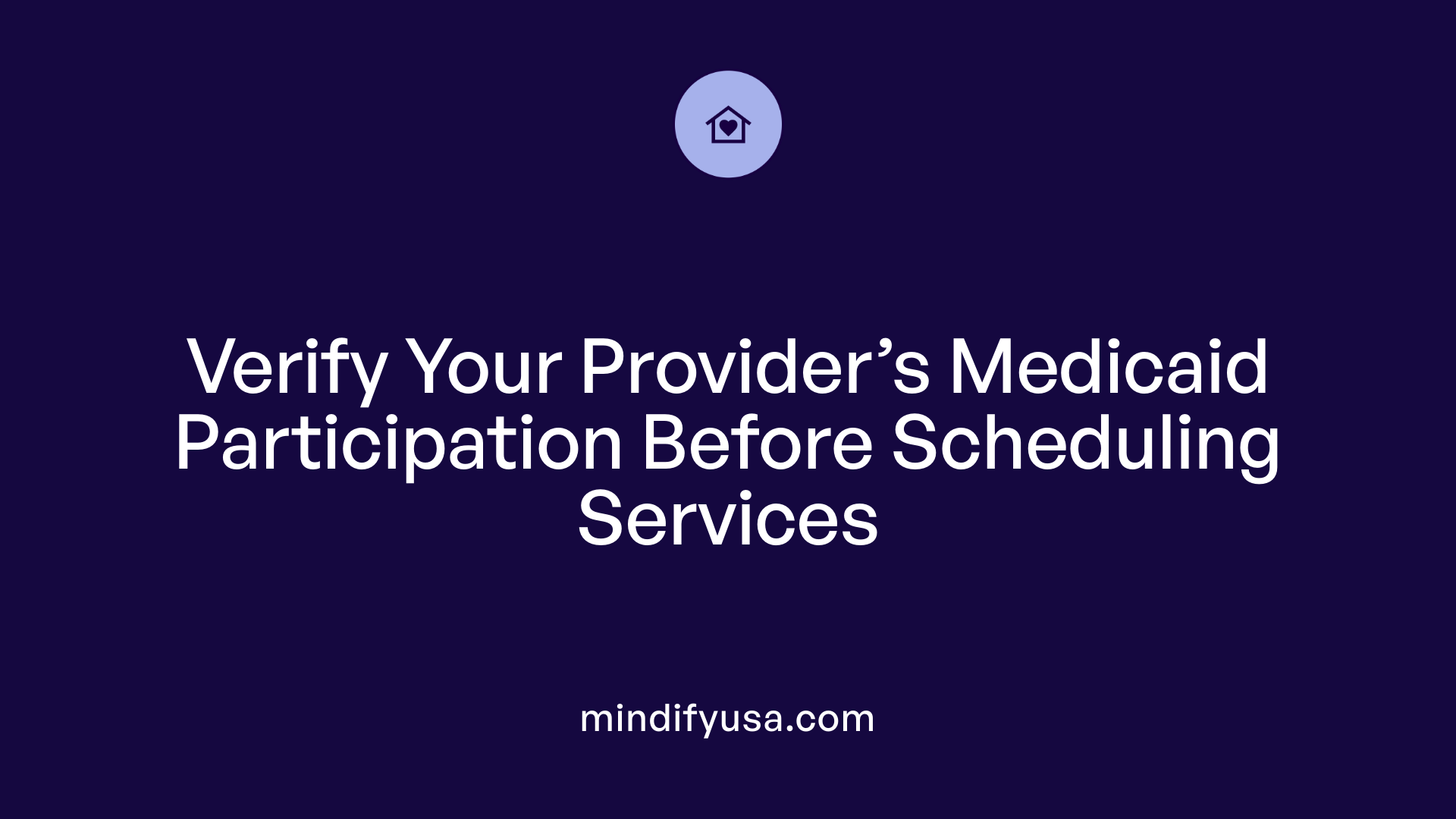Understanding Medicaid Coverage for At-Home Therapy Services in NJ
Medicaid in New Jersey offers a comprehensive array of services aimed at supporting enrollees with healthcare needs within the comfort of their homes. From physical therapy for recovery and chronic condition management to mental health support via teletherapy, beneficiaries may access many in-home services. This article explores the scope, eligibility, limitations, and practical aspects of at-home therapy coverage under Medicaid in NJ, helping recipients and caregivers navigate available options and requirements.
Medicaid's Support for Teletherapy in Mental Health Care
What forms of teletherapy are covered?
Medicaid recognizes various digital platforms for delivering mental health treatment. Teletherapy can be conducted through video calls, phone calls, or messaging apps, providing flexibility for patients. This includes both clinical and nonclinical services, such as individual therapy, family counseling, and peer support.
The coverage extends to different types of therapy, including specialized programs like intensive outpatient programs (IOPs). Providers are often approved to deliver these services remotely, ensuring that individuals receive consistent support regardless of their location.
Are virtual mental health services included?
Yes, Medicaid covers online therapy services comprehensively. Patients can access virtual therapy sessions that include individual counseling, group therapy, medication management, and psychiatric evaluations. Prominent providers like Charlie Health offer a range of mental health treatments via telehealth, allowing clients to receive care from their homes.
Medicaid's teletherapy coverage is not limited to traditional sessions; it also encompasses ongoing support such as crisis intervention and follow-up care. These services help address conditions like depression, anxiety, PTSD, and substance use disorders effectively.
How accessible are teletherapy options?
Access to teletherapy has significantly improved, especially during and after the COVID-19 pandemic. Medicaid policies support this shift by removing many barriers associated with in-person visits. Eligible individuals can use online directories and state-specific resources to find providers accepting Medicaid.
Moreover, many programs now offer rapid enrollment, with some patients beginning treatment within 24 hours of verification. The increased acceptance of telehealth technology has made mental health support more convenient, especially for those living in remote or underserved areas.
Furthermore, Medicaid's support for teletherapy includes guidance on navigating coverage limitations, such as session caps and out-of-pocket costs, which vary by state. Overall, the integration of telehealth into Medicaid services has expanded access and improved the delivery of mental health care for millions across the United States.
Coverage of Physical Therapy in the Home Setting
Is at-home physical therapy covered?
Medicaid generally provides coverage for physical therapy services, including those delivered in the home. This is part of its broader aim to support access to healthcare outside traditional clinical settings. Providers certified by Medicaid can offer these services, emphasizing rehabilitation, recovery, and maintenance of mobility.
In New Jersey, Medicaid covers in-home physical therapy if the treatment is deemed medically necessary by a healthcare professional. The therapy supports recovery from surgery or illness, chronic illness management, or functional improvements. Organizations like Luna and Virtua Home Health Care are among approved providers that deliver these services directly at home.
While coverage is available, it’s essential to understand that it varies by state and individual plan. Some plans may have limitations on the number of visits or session durations.
What requirements must be met for coverage?
To qualify for at-home physical therapy under Medicaid, several conditions must be satisfied:
- Medical Necessity: The treatment must be recommended by a licensed healthcare provider who documents that in-home therapy is essential for recovery or maintaining function.
- Physician’s Orders: A formal prescription or plan of care from a physician or qualified healthcare professional is typically required.
- Certified Providers: Services must be provided by licensed or Medicaid-approved therapists or agencies, such as Atlantic Visiting Nurse or Virtua.
- Individualized Plan of Care: A tailored plan must be developed, outlining specific therapy goals and scheduled visits.
- Documentation and Approvals: Proper documentation and, in some cases, prior authorization are necessary to ensure coverage.
Are pre-authorizations necessary?
Yes, pre-authorization is usually required before starting in-home physical therapy services. Patients or providers should submit a detailed plan of care to Medicaid for approval. This step helps verify that the service meets medical necessity criteria and is eligible for reimbursement.
Pre-authorization processes can vary slightly depending on the state and specific Medicaid plan. Providers like Luna and Virtua regularly handle these procedures, making it easier for beneficiaries to access services without delays.
| Question | Answer | Additional Notes |
|---|---|---|
| Does Medicaid cover physical therapy at home? | Yes, often, if deemed medically necessary. | Coverage depends on state and individual plans. |
| What requirements must be met for coverage? | Medical necessity, physician’s prescription, use of approved providers, proper documentation. | A personalized plan of care is essential. |
| Are pre-authorizations necessary? | Usually, yes, prior approval from Medicaid. | Providers typically assist with securing authorization. |
This comprehensive approach ensures that eligible patients can reliably access in-home physical therapy, making recovery and daily functioning more manageable and less burdensome.
Medicaid’s Range of At-Home Therapy Services & Limitations
What types of therapy services are covered at home?
Medicaid covers a variety of therapy services delivered in the home, including skilled nursing, physical therapy, occupational therapy, speech-language pathology, and mental health services. These therapies aim to assist individuals in recovering from illnesses, managing chronic conditions, and maintaining their independence. Programs such as NJ FamilyCare in New Jersey also include nonclinical supports like home-delivered meals, personal care, and respite services through Medicaid waivers such as Community Choice, MLTSS, and the Personal Preference Program.
Specific therapies like physical, speech, and occupational therapy require physician approval and a detailed care plan. Home health agencies certified by Medicaid, such as Virtua Home Health Care and Atlantic Visiting Nurse, offer these services, ensuring they are tailored to individual medical needs. Mental health therapies conducted via teletherapy are also increasingly recognized as effective and accessible, with Medicaid supporting their use for conditions like depression, anxiety, and PTSD.
What are the benefits and scope?
The main advantage of Medicaid-covered home therapy services is improved access, especially for individuals with mobility issues, those living in remote areas, or those facing scheduling or financial barriers. These services promote independence by enabling patients to receive necessary care without hospital or nursing home stays.
Coverage extends to helping individuals perform Activities of Daily Living (ADLs) such as bathing, dressing, and eating, and Instrumental Activities of Daily Living (IADLs) like meal prep and household chores. The services also support medical management, rehabilitation, and ongoing care tailored to each person's condition. For example, Luna provides physical therapy sessions at home across the U.S., and Medicaid patients can begin therapy without a referral in many states, increasing convenience.
The scope also includes preventive and supportive services, like assistive devices, home modifications, and emergency response systems, which foster safer and more comfortable living environments. These services aim to reduce hospital readmissions and delay or prevent institutionalization.
Are there specific limitations and restrictions?
While Medicaid offers extensive support for at-home therapy, several limitations exist. Coverage often varies by state and specific program; some services may be limited in hours per week or require prior authorization. For instance, non-skilled or custodial care services, like household chores, may be restricted or not classified as covered under skilled therapy provisions.
Eligibility is based on strict criteria such as income, assets, and medical necessity. For example, in New Jersey, individual income must not exceed $13,596 per year, and assets must be below $4,000 for eligibility. Additionally, certain therapies, such as specialized or long-term treatments, may face restrictions or require specific approvals.
Another limitation involves the scope of services provided by non-certified providers or non-certified agencies, which are typically not covered. For durable medical equipment or extensive supplies, prior authorization may be needed, and coverage limits could apply.
Overall, Medicaid’s capacity to support at-home therapy is substantial but not unlimited. The specifics depend heavily on state policies, available waivers, and individual health needs.
| Aspect | Description | Additional Notes |
|---|---|---|
| Covered Services | Physical, occupational, speech therapy, mental health, nonclinical supports | Requires medical necessity and certification |
| Eligibility | Income <$13,596/year (NJ), assets <$4,000 | Varies by state and specific program |
| Limitations | Session caps, prior authorization, non-skilled care restrictions | Different programs have different rules |
| Delivery Method | In-home visits, teletherapy (mental health) | Increasing acceptance and use |
| Additional Supports | Assistive devices, home modifications, emergency systems | Focus on safety and independence |
| Common Providers | Certified home health agencies, private therapists | Must be Medicaid-approved |
For those seeking more information on Medicaid home therapy benefits in New Jersey, searching terms like "Medicaid home therapy benefits NJ" can provide detailed, localized guidance.
Eligibility and Coverage for Seniors and Disabled Individuals
Are at-home therapies available for seniors?
Yes, seniors enrolled in Medicaid can access various at-home therapy services. These include skilled nursing, physical therapy, occupational therapy, speech-language pathology, and personal care services. Such therapies are designed to help seniors recover from illness, manage chronic conditions, or maintain their independence at home.
The availability of these services depends on individual medical needs and eligibility criteria. Many programs within Medicaid, such as Long-Term Services and Supports (LTSS) and Home and Community-Based Services (HCBS) waivers, focus on providing in-home care tailored to seniors' needs.
What programs support elderly and disabled populations?
Several Medicaid initiatives in New Jersey facilitate support for the elderly and disabled individuals to live independently:
| Program Name | Description | Services Provided | Additional Details |
|---|---|---|---|
| Community Choice | Helps seniors stay in their homes by covering personal care and transition services from nursing homes. | Personal care, home modifications, transition support | Focuses on aging in place for seniors. |
| Managed Long-Term Services and Supports (MLTSS) | Offers managed care options with comprehensive in-home and community services. | Care management, home-delivered meals, respite, emergency response | Expands access to personalized care. |
| Personal Preference Program | Allows participants to choose specific services like light housekeeping and meal prep. | Light housekeeping, meal prep | Participants select services within a given budget. |
These programs aim to enhance community living, ensuring individuals receive necessary health and support services at home.
What are the eligibility criteria?
Eligibility for Medicaid and its home care services involves several financial, medical, and personal factors:
- Financial Requirements: Income limit of $13,596 per year for individuals in New Jersey, with assets not exceeding $4,000. These limits can vary based on specific programs and circumstances.
- Medical Need: Participants must demonstrate a need for health-related services, such as assistance with daily living activities or skilled nursing.
- Age and Disability Status: Eligibility extends to those aged 65 or older, individuals under 65 classified as blind or disabled, and children under 21 with qualifying conditions.
- Assessment Process: Medical assessments and care plans are required to verify need.
- Application Process: Applications can be submitted online via the NJ FamilyCare website or through local agencies like the County Area Agency on Aging or the Division of Disabilities Services.
Are at-home therapy services covered for seniors under Medicaid?
Yes, at-home therapy services are covered for seniors under Medicaid, but coverage depends on individual eligibility, including medical need, income, and resource limits. Medicaid offers various programs such as LTSS, HCBS waivers, and PACE that provide home-based services, including skilled nursing, physical therapy, and other therapeutic services, often requiring a demonstration of need and level of care.
Coverage and specific services vary by state, with some states offering additional home and community-based options to help seniors remain in their homes. Eligibility typically involves medical assessments and financial criteria, with certain services requiring prior authorization and participation from Medicaid-accredited providers. Therefore, seniors should check with their state's Medicaid program to understand available benefits, eligibility, and provider options tailored to their needs.
More information
For further details about Medicaid's elderly and home care programs in New Jersey, search using: Medicaid elderly home care NJ. This search can lead to official state resources, provider directories, and guides to help seniors and their caregivers navigate available services and obtain necessary support.
How to Access and Find Providers for In-Home Therapies

Resources for locating Medicaid-approved providers
Beneficiaries seeking in-home therapy services covered by Medicaid can start by exploring various resources designed to help identify approved providers. State Medicaid agencies typically offer online directories and search tools where enrollees can locate healthcare providers specializing in home health care, physical therapy, mental health counseling, and other related services. For example, in New Jersey, individuals can access these listings through the NJ FamilyCare website or local Medicaid offices.
In addition to official state directories, several third-party online platforms compile lists of Medicaid-participating providers. Reaching out to local health departments or community health centers can also provide valuable information, as they often collaborate with Medicaid programs and maintain updated provider networks.
Many providers participate in Medicaid managed care programs, which can be verified through their websites or by direct contact. For caregivers and patients, it's essential to confirm provider participation and whether they are licensed or certified for the specific type of therapy required.
How to verify provider eligibility?
Before scheduling an in-home therapy session, beneficiaries should verify that the chosen provider is approved by Medicaid and licensed to deliver the aimed service. This verification involves checking multiple aspects:
- Confirming the provider accepts Medicaid by consulting state directories or contacting Medicaid customer service.
- Ensuring the provider is certified or licensed in the respective therapy area, such as physical therapy, speech-language pathology, or mental health counseling.
- Checking that the provider has necessary credentials with relevant state licensing boards.
- Understanding if prior authorization is needed for the specific therapy services.
In states like New Jersey, this can be done by reviewing the provider's profile in the NJ FamilyCare directory or through online licensing boards.
Steps for scheduling in-home therapy sessions
Once a suitable provider is identified and eligibility is confirmed, beneficiaries should follow these steps to schedule their sessions:
- Contact the provider directly via phone or through their online booking system.
- Verify coverage details including sessions limits, co-payments, and whether prior authorization is necessary.
- Discuss specific therapy needs, preferred scheduling times, and any special requirements.
- Confirm the provider’s availability and schedule the first appointment.
- Ensure that the provider’s documentation meets Medicaid documentation standards, such as providing a plan of care approved by a physician if required.
- Keep records of all communications and confirmations for future reference.
For ongoing care, maintaining regular communication with both the provider and Medicaid is important to avoid gaps in coverage or services. Assistance from certified navigators or local outreach programs can help streamline these steps and address any questions.
Medicaid Application and Qualification Processes in NJ

How can one apply for Medicaid in New Jersey and qualify for in-home therapy coverage?
Applying for Medicaid in New Jersey is a straightforward process accessible through multiple channels. Prospective beneficiaries can submit their applications online via the NJ FamilyCare website, which offers a convenient and efficient way to get started. Alternatively, individuals can visit local outreach sites or seek assistance from certified navigators who are trained to guide applicants through the process.
To qualify for Medicaid, including coverage for in-home therapies, applicants must meet specific financial criteria. The income threshold for an individual is set at $13,596 per year, and assets must not exceed $4,000. These limits can vary slightly for married couples or in particular circumstances. Beyond financial eligibility, medical necessity plays a significant role. Applicants must provide documentation verifying their health condition and need for in-home services, which is typically assessed through medical evaluations and clinicians' notes.
The application review process involves submitting proof of income, assets, and medical necessity. Once submitted, the application undergoes evaluation by state officials to determine if the applicant qualifies under the set criteria. After approval, individuals gain access to a broad range of covered services, including physical, occupational, speech therapy, and other home health services, provided through authorized providers.
This streamlined process ensures that eligible residents of New Jersey can access essential healthcare services in their homes, promoting convenience, comfort, and recovery.
What are the eligibility criteria for in-home therapy benefits?
Eligibility for in-home therapy benefits under Medicaid in New Jersey depends on several factors. First, applicants must be residents of the state and meet the financial requirements outlined above. Additionally, they must demonstrate medical necessity, meaning a healthcare provider must certify that in-home therapy is essential for their treatment and recovery.
Other criteria include age and health status. For adults, the need for assistance with Activities of Daily Living (ADLs) such as bathing, dressing, or mobility, or for medical services like physical or speech therapy, is typically required. Children from birth through 20, qualifying for Medicaid based on clinical criteria related to functional limitations, are also eligible.
Health conditions such as chronic illnesses, recovery from surgery, or management of disabilities can qualify an individual. The eligibility process involves detailed assessments to ensure that the services provided align with the person’s health needs.
What documentation and application procedures are involved?
Applicants must prepare and submit various documents to establish their eligibility. These include proof of income, such as recent pay stubs or tax returns, and documentation of assets, like bank statements or property records. Medical documentation from licensed healthcare providers is also necessary, certifying the health condition and specifying the type and frequency of in-home therapies needed.
Applications can be completed online through the NJ FamilyCare portal, which guides users through the required steps and documentation uploads. In-person assistance is available at designated outreach sites or through certified navigators who can help gather and submit necessary paperwork.
Once submitted, the application is reviewed, and if approved, the applicant will receive confirmation and instructions for accessing services. Providers must be approved by Medicaid to deliver covered therapies, ensuring quality and consistency in care.
This process aims to make health services accessible and efficient, reducing barriers for those in need of medical and therapeutic support at home.
Future Outlook and Innovations in At-Home Therapy Coverage

What is the future outlook for Medicaid-covered at-home therapies in NJ?
The future of Medicaid-covered at-home therapies in New Jersey appears optimistic, driven by technological progress and a shift toward community-centered care. Officials and healthcare providers are actively exploring ways to make in-home therapy more accessible and effective for their enrollees.
Advancements such as telehealth platforms, remote monitoring tools, and virtual therapy programs are at the forefront of this transformation. These innovations allow patients, including those living in rural or underserved areas, to receive high-quality care without traveling to clinics or hospitals. For example, online therapy sessions and remote physical therapy through platforms like Luna provide convenience and continuity of care.
Furthermore, policymakers are keen on expanding in-home services and integrating mental health support into primary healthcare settings. This integration promotes comprehensive care, streamlining services for individuals with complex needs. Efforts to improve care coordination and foster collaboration among healthcare providers are also ongoing.
Research consistently demonstrates that virtual therapies can be as effective as in-person treatments, particularly for conditions like depression, anxiety, and PTSD. These findings are influencing policy changes, encouraging Medicaid programs to broaden coverage and reduce barriers to access.
Looking ahead, continuous technological innovations and data-driven approaches are expected to further refine in-home therapy services. These may include more sophisticated remote monitoring devices, personalized virtual care plans, and enhanced telehealth infrastructure.
Overall, Medicaid in New Jersey is poised to increase opportunities for in-home therapies. This evolution aims to make supportive services more accessible, efficient, and tailored to individual needs, ultimately improving health outcomes and quality of life for many enrollees.
Ensuring Access to Essential In-Home Therapies
Medicaid coverage for in-home and teletherapy services in New Jersey provides vital support for individuals aiming to recover, manage chronic conditions, and maintain independence at home. While coverage varies depending on the type of therapy, individual circumstances, and specific program eligibility, beneficiaries can access a broad spectrum of services—from mental health counseling via virtual platforms to physical therapy and assistance with daily activities. By understanding the available programs, eligibility criteria, and provider resources, NJ Medicaid enrollees can better navigate the system to receive necessary care. As the landscape continues to evolve with technological and policy innovations, the future promises even greater accessibility, convenience, and quality for at-home therapy services in New Jersey.
References
- Teletherapy That Accepts Medicaid - Mental Health Services NJ
- Home Care in New Jersey - HomeCare.org
- N.J. Admin. Code § 10:60-2.1 - Covered home health agency services
- Medicaid Managed Long Term Services and Supports (MLTSS)
- Home Health | Atlantic Health
- Home Health Care Services - Virtua
- Medicaid Therapist in NJ - Empower U
- Medicaid and In-Home Care: Eligibility, Benefits & State Rules






































































































